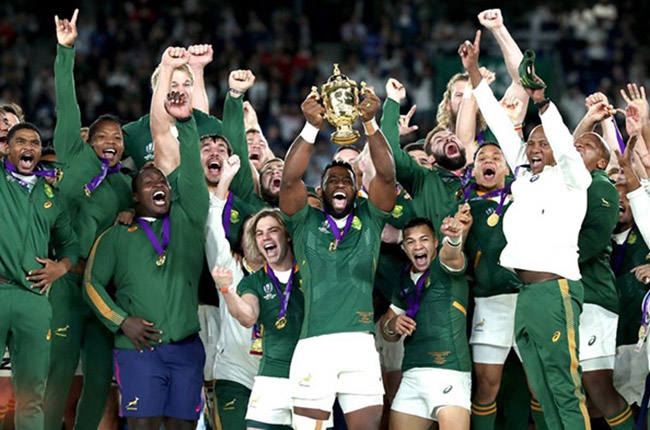


Springboks (Getty Images)
- England’s RFU is looking into whether pre-match war cry Swing Low, Sweet Chariot ought to be banned from Twickenham.
- The song, according to preliminary investigations, was first sung in the late 1980s as an homage to Martin “Chariots” Offiah and Chris Oti, England’s black wingers of the time.
- It is unclear whether Swing Low, Sweet Chariot, which was composed during the slave trade, was sung to show endearment towards or to single out Offiah and Oti.
- Die Blou Bull song still blares out at Loftus despite being composed by controversial figure Steve Hofmeyr.
- SA Rugby should investigate whether Craven Week, named after Danie Craven, is an appropriate name for the iconic schoolboy tournament.
Rugby organisations the world over have been looking introspectively at some of their practices and those of their fans, in an attempt to root out any form of prejudice they may harbour.
It is a lead South African rugby, especially the many pockets that protect symbols of prejudice, needs to follow, post-haste.
Last week, reports emerged the English Rugby Football Union (RFU) was looking into whether Swing Low, Sweet Chariot, sung by its fans before Twickenham Tests, bears racist tones.
Prompted by the ever-growing Black Lives Matter movement, the RFU is investigating the appropriateness of the song being sung by fans at its iconic home stadium for the past three decades.
The song has its roots during the slave trade – a “Negro spiritual” folk song – and, according to Wooster College professor of music and black studies Josephine Wright, belonged to a category of songs called an “alerting song”.
The singing of the song at Twickenham, according to British newspaper reports, began as a cheer when black England players Martin “Chariots” Offiah and Chris Oti scored in the 1980s.
The RFU does not know whether well-meaning fans meant to sing it as a form of endearment towards the two rugby players or that they were being singled out for the colour of their skin. Rightly, they have taken the microscope and turned it inwards.
The same can be said of the Crusaders, the southern hemisphere’s most prolific and successful rugby club. After a gunman went on a murderous rampage, killing 51 people in two Christchurch mosques last year, they replaced their knight and sword logo with a Maori motif.
Although it decided to keep its name, the reason behind the logo change were the Crusaders’ links to medieval religious wars between Muslims and Christians.
These may seem like small, cosmetic alterations but they go a long way to inculcate a new culture of acceptance and sending a strong message that you will no longer harbour prejudicial practices or undertones within your organisation or sport.
The same cannot be said about some areas of the sport in South Africa. For instance, in spite of a 2018 report that Die Blou Bull song would be banned at Loftus, the song is still on-brand for the Blue Bulls.
This despite its composer, Steve Hofmeyr, having made more than one racist remark, which has cost him a ward of sponsorship deals and cast him as a pariah in the entertainment industry.
The association with Hofmeyr would drive any self-respecting organisation to take a firm stand and ban all links to anyone who has displayed covert or overt prejudice. But it is still being played at the stadium, although not when the team runs out of the tunnel.
In a broad sense, rugby has made strides to transform the game and Siya Kolisi winning the Rugby World Cup as the first black African Springbok captain last year went a long way in uniting different cultural and race groups within the game and its followers.
But questions still loom uncomfortably large around some of its symbols, such as the “godfather” of the game, Danie Craven, who was quoted as saying black people would play for the Springboks “over his dead body” and the springbok has “always been associated with whites and the leopard with blacks”.
There are many statues and monuments paying homage to Craven, but it is yet unclear whether he stood for a united South African rugby public, with every member of the population deserving of representation in the Bok jersey or a segregated one.
While they may have passed another round of transformation box-ticks, according to the sport department’s EPG report, SA Rugby ought to investigate whether it has transformed the sport culturally.
A deep investigation into whether the iconic youth rugby tournament, the Craven Week, should go by another name is the least they should do at a time like this.

